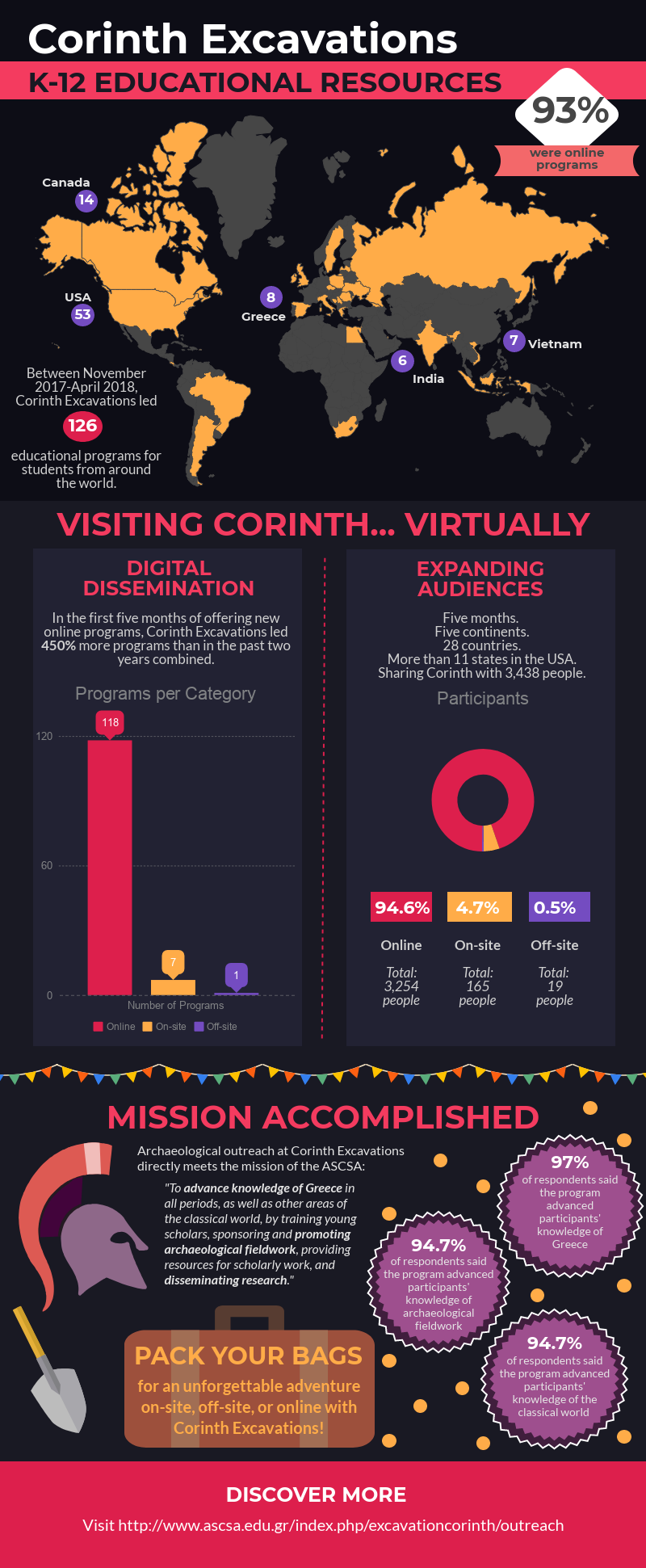2018 Record-breaking Corinth Excavation & Museum Sessions
Local favorite dog, Fluffmonster, kept excavation supervisors entertained near the sieve.
Corinth Excavations has completed the final session of excavation and museum projects for the 2018 season. Excavation was conducted northeast of the Theater under the direction of Corinth Excavations Director Chris Pfaff with the goal of exploring the area between the Theater and Gymnasium. Corinth Excavations discovered 705 coins during the 2018 season-- a new record!
For the first time in 122 years, excavation recording at Corinth Excavations went digital. Using iDig, the main recording tool of the Agora Excavations, all notes, contexts, objects, plans, drawings, photos, and conservation files were integrated in one single platform. Excavation supervisors entered data directly from the field, simplifying the excavation process and allowing them to focus more time reading pottery, studying small finds, identifying coins, and savoring saganaki at ouzo hour.
Here is a summary of Corinth's major activities this spring, and be sure to view the slideshow of images below the educational programs infographic.
April
The April season excavation supervisors were Haley Bertram, John Haberstroh, Janelle Sadarananda, Peter Moench, Katie Fine, and Manolis Papadakis, Assistant to the Associate Director. Sarah Beal volunteered in the museum studying Roman pottery, including creating, updating, and inventorying over 160 records on the database. Jeff Banks returned to continue his museum work on Early Helladic Corinth material from the well at Cheliotomylos.
Katie Petrole, the Steinmetz Family Foundation Museum Fellow, won two awards to attend Executive Leadership Development in Heritage Management workshops. Thanks to these trainings, she developed promotional materials for Corinth Excavations’ K-12 educational resources and became a Certified Interpretive Guide through Interpret Europe after completing the Heritage Management Organization’s “Personal Interpretation for Natural and Cultural Heritage” course. In addition, she led 25 on-site and online educational programs for 794 people.
May
The May season excavation supervisors were Christina DiFabio, Katie Fine, Sara Hilker, Gretchen Stricker, Janet Spiller, and Jessica Tilley. Chris Hayward worked in the museum to create a color catalog for glass artifacts, and Laura Hutchison worked in the museum adding new information and insights to nearly 100 sculpture records.
Katie Petrole won an award to attend an Executive Leadership Development workshop on strategic planning. After an introduction to strategic concepts, she participated in an intensive strategy simulation with MA students from the University of Kent and the AUEB. Throughout May she led 29 on-site and online educational programs for 722 people.
June
The June season excavation supervisors were Simone Agrimonti and Katie Fine, with Chris Pfaff directly supervising excavation work as well. Sara Hilker worked in the museum cataloging and numbering (and renumbering) over 140 Zygouries artifacts.
Katie Petrole led 11 on-site and online educational programs for 405 people and began analyzing results from the first evaluation group. For a sneak peek at her findings from educational programs conducted November 2017-April 2018, please see the infographic below.
Corinth Excavations hosted the Malcolm H. Wiener Laboratory for Archaeological Science’s Field School on Site Formation, Stratigraphy, and Geoarchaeology, led by Takis Karkanas and Paul Goldberg.
On Saturday, June 23, Corinth Excavations, with the support of the Corinthian Ephorate of Antiquities, held a major on-site educational program for families. Manolis Papadakis organized the program with Discover Greek Culture for the CosmoteTV History channel. Children and families were introduced to excavation and conservation methods, and learned how to excavate, sieve, wash pottery, mend pottery, and see how artifacts end up in a museum. Kathimerini recently published a summary of the day's activities in an article titled "Thirty-one children became archaeologists for one day" or "Τριάντα ένα παιδιά έγιναν αρχαιολόγοι για μία ημέρα". Pictures coming soon!
At the end of June, the artifacts in the most desperate need of new storage solutions were moved into Corinth Excavations’ New Apotheke.
With scholar season now in full swing, Corinth Excavations is welcoming back those who call Corinth home every summer.
